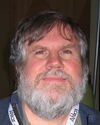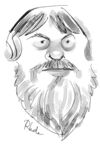Karl Auerbach
 |
 |
| Country: | USA |
| Website: | |
| LinkedIn: |
Karl Auerbach is the Chief Technology Officer at InterWorking Labs in Scotts Valley, California. Auerbach has been working on the Internet and operating system technology since the early 1970's. He has been a long-time member of the Internet Engineering Task Force.
He is the former North American publicly elected member of the Board of Directors of ICANN.
Past Work
Karl Auerbach was formerly a senior researcher in the Advanced Internet Architecture group in the Office of the Chief Strategy Officer at Cisco Systems. In addition to his technical work, Mr. Auerbach has been an attorney in California since 1978. He is a member of the Intellectual Property Section of he California State Bar.
He founded both Epilogue Technology Corporation and Empirical Tools and Technologies, Inc. Also got involved with several other startups including Precept Software where in the mid 1990's he architected and implemented IP/TV, a pioneering product for internet distribution of entertainment grade video over the internet.
Education
He has received education from Loyola Law School, Loyola Marymount University, University of California, Berkeley and University of California, Los Angeles.[1]
Awards and Honors
He has been named as a Yuen Fellow of Law and Technology at the California Institute of Technology and Loyola. He has also received the Norbert Wiener Award from the Computer Professionals for Social Responsibility.
Groups and Associations
He is a co-founder of the Boston Working Group and has been involved in the issue of Internet governance for several years. Mr. Auerbach is helping to create a an open voting system. He is on the Board of Directors of the Open Voting Consortium. He is also a "Pioneer Member" of The Internet Society.
Interests
In his spare time he does backstage work with a professional theatre company and also is helping to restore a 1923 mainline steam locomotive.[2]
